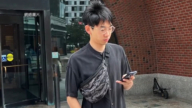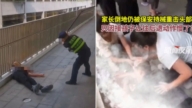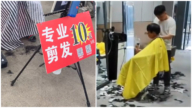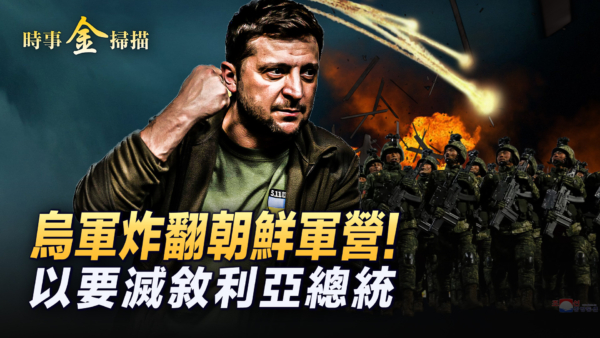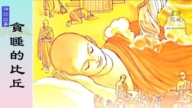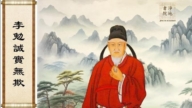【新唐人2012年11月24日訊】中科院博士生導師程代展,最近在博客寫下3000多字的長信,對他的學生——清華博士生放棄科研的機會,選擇當中學老師,感到惋惜與困惑。這封信很快被瘋狂轉載,社會上甚至引發了「中國為甚麼培養不出傑出的科研人才」的討論。
程代展是中科院博士生導師,他在11月13號以「昨夜無眠,為了一個學生。」為題,在博客上寫下長信,字裡行間表達出對他學生蕭楊(化名)放棄科研,選擇執教中學,感到惋惜與困惑。他寫道:「你這樣做,中國甚至世界可能會失去一個優秀的科學家。」
蕭楊曾在系統控制領域的國際頂級專業期刊(IEEE TAC)上,以第一作者的身份發表數篇長論文。中國系統控制領域的博士生導師,沒有幾人能在這本期刊上發表文章。
這封信引起網友的種種議論,如:「大材小用、科研界的損失」、「國家投入幾乎白費了」 、 「太過現實的社會環境讓人才流失」也有人認為蕭楊有自由選擇的權利,「中學老師的貢獻不比高校科研人員低。」。
台灣精神健康基金會論壇組召集人陳彥玲:「在中共那種一言堂的管控之下,他真正的想法不見得能說出來,也有可能他發現需要有一些精神上的追求,他開始發現這些科研成就實際上被別人拿走了,他沒有申冤的地方。當人挫敗、發現沒有希望的時候,他可能選擇一條所有人非常驚訝的路。」
台灣精神健康基金會論壇組召集人陳彥玲還指出,中國傳統重視人與人、人與天地之間的和諧,再加上「修齊治平」、「因果報應」等正統教育,使讀書人眼界開闊、心胸寬廣。但中共統治大陸後,人在精神層次的東西逐步被泯滅了,社會又極度不公平,人生價值觀出現了扭曲,容易做出極端的事。
而大陸網友指出,在大陸講的是關係,幹得好不如關係好。
大陸網友:「說的是『科技興國』、人才強國,實際上對人才的打壓是很嚴重的。願意工作的、願意幹的,它打壓,不工作、混的,他提拔。」
對於導師的不理解和網友的議論,蕭楊18號在一個社交網站上貼出一封長信回覆老師,他表示,他「已經厭惡科研了,執教中學感覺久違的輕鬆。」
蕭楊的離職並非一時的頭腦發熱,是經過深思熟慮後的選擇,這又引發了另一個討論:「為甚麼中國的學校總是培養不出傑出的科研人才?」
「深圳當代社會觀察研究所」所長劉開明指出,大陸大學學術的行政化、官僚化,沒有學說自由和學術獨立等環境,是導致「難出大師」的原因。
「深圳當代社會觀察研究所」所長劉開明:「人文科學它必須是以馬克思主義為框架,這就把大多數的人類的文明給排除在外,這就對人文學科研究有巨大的侷限。同樣,人文學科自由不能貫徹的話,自然學科基礎的一些思維方法就會受到限制。」
劉開明還指出,學校只注重知識、不注重學生獨立思考能力﹔社會需要的是「螺絲釘」,又怎能培養出優秀人才呢?
美國《華爾街日報》在今年9月發表一篇文章指出,中國在科學方面的創新貢獻僅佔1%,成就不僅與英、美、德以及歐洲諸國相差甚遠,較其他文明古國也相形遜色。
世界知名數學家丘成桐教授曾經說過一個故事,中國一個本科生畢業的時候,就因為他的想法很獨特,教授不讓他讀研究生。丘成桐堅持收為學生,後來這名學生到美國「哈佛大學」做了博士後,成了材。
劉開明表示,中國教育體系有「精神桎梏」、學術研究有「政治桎梏」,從49年後再沒出過大師,也就不足為怪了。
採訪/易如 編輯/宋風 後製/周天
Ph.D in Tsinghua University Teaches in a High School
Cheng Daizhan, a Professor in Chinese Academy of Sciences,
recently wrote a 3,000 characters letter on microblog.
It was to show his sympathy and confusion towards his Ph.D
student giving up research opportunities to become a teacher.
His letter was forwarded massively, and triggered a discussion
in the community on why China cannot cultivate talents on scientific research.
On Nov. 13th Cheng Daizhan published an article on his
microblog called “I was sleepless last night for a student”.
Showing his sympathy and confusion for his student, Xiao Yang,
to give up research and become a high school teacher.
He wrote, “You do so, and then China may lose
an outstanding scientist.”
Xiao Yang once published many long articles as the first
author on IEEE TAC, a top journal for systematic control.
Even for faculty members in this field, not many people
could publish articles in this journal.
This letter has triggered all kinds of discussions,
including “overkill, the loss of the research community”,
“the state investment is almost in vain",
“too realistic social environment causing the brain drain" ……
But some believe Xiao Yang also had the freedom of choice,
“the contribution of a high school teacher is no less than university researchers."
Chen Yanling, an organizer for the Mental Health Foundation
Forum in Taiwan: “Under the control of speeches by the Chinese Communist Party (CCP),
he could not speak out his true thoughts.
It is possible that he needs some mental pursuit,
or his research results were taken away by others.
But he had nowhere to appeal. When one got frustrated
and finds no hope, he may choose a way out surprising all.”
Chen Yanling also pointed out Chinese traditions emphasize
the harmony among human beings and between heaven and earth.
In addition, the orthodox education of cultivation and
retribution of karma also makes scholars broad-minded.
However, after the communists took over the power in China,
the spiritual contents were gradually destroyed.
The society is extremely unfair, so people’s values of life
were distorted, and they now easily go to extremes.
Netizens in China pointed out that in China
it is focused on people’s relationships. Good relationship is more important than hard working.
A Netizen in China: “The CCP is saying to strengthen our
country by science and technology and talented people.
However, the suppression of talented people is very serious.
Those willing to work are suppressed;
those who do not work, are usually promoted."
As the advisor did not understand and for netizens’ arguments,
Xiao Yang wrote back a long letter in reply on Nov.18th.
He said he hates research, and teaching in high school
gave him the easy feeling again.
Xiao Yang’s departure is not a fad, but a thoughtful choice,
which in turn led to another round of discussion:
“Why Chinese schools can’t cultivate outstanding researchers?"
Liu Kaiming, director of Shenzhen Institute of Contemporary
Observation pointed out,
in China an academic becomes administrative and bureaucratic,
and there is no freedom of doctrines, or independence environment.
This is the reason that it is difficult to cultivate masters".
Liu Kaiming: “Humanities disciplines must be based on
the Marxist framework,
which excludes most of the human civilizations and
had enormous limitations to the humanities research.
Similarly, if the humanities freedom cannot be implemented,
the natural sciences- based way of thinking will be limited."
Liu Kaiming also pointed out that schools focus only on
knowledge, without paying attention to develop the ability of students to think independently;
The society needs ‘screws’, how can it cultivate talents?
In September 2012, the Wall Street Journal in USA published
an article pointing out that China’s contribution in science innovation is only 1%.
That lack of achievement is not only far away from the results of
the UK, USA, Germany and European countries, but is also below the standards of ancient civilizations.
The world-renowned mathematician,
Professor Qiu Chengtong once told a story:
Once a Chinese student graduated with a bachelor’s degree.
Because his idea was unique, his advisor won’t accept him
in the graduate school.
Qiu Chengtong insisted on accepting him as a a student.
Later this student became a postdoctoral student in Harvard University in USA.
Liu Kaiming said, China’s educational system has spiritual
shackles, and academic research has political shackles.
There is no master appearing after 1949,
which is not surprising.







